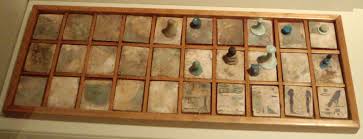Board Game From Ancient Times

A board game from Ancient Russia found in the Vyborg reserve.
October 10, 2018
Archaeologists have uncovered a medieval board game in a secret chamber beneath an ancient Russian castle. This chamber may link the castle, which stands on a tiny island, to the nearby city of Vyborg.
According to a Russian social media post from the director of the Vyborg Museum-Reserve, Vladimir Tsoi, the game, carved into a clay brick, is probably a version of nine men’s morris, a strategy game that sees players battle with small pieces known as “men.”
“Humans have been playing a variation of this game for centuries. Similar games have been discovered at ancient sites everywhere from India and China to what was once the Roman Empire. Archeologists have discovered that they played this game when there was any spare time, which was limited back in their time,” history teacher Matthew Smith said.
In the game, each player aims to claim the other’s men, much like the pieces in chess. When a player builds a “mill” or a row of three men on the grid-like board, they are rewarded with an opponent’s game piece. Once a player is down to just two men, they are unable to form mills and their opponent claims victory.
“People do not realize that people had lives back then and it’s so interesting to experience different cultures with this type of stuff. It gives some insight as to what it was like being in that era,” senior Pheobe Mitchell said.
The 13th-century Vyborg Castle rises from an islet near the Finnish border. Its large domed tower looms some 160 feet. Karelia is a historical province of Finland, first inhabited thousands of years ago, according to an article from NewsWeek.com.
Over its long history, the castle has been passed between Russia and Finland multiple times, most recently in 1944, when it was taken over by the Soviet Union. Today, the site, which serves as a museum, is a major tourist attraction in the region.
“It is just crazy to know that people in ancient cultures did things that we would consider normal hobbies today. They didn’t have as much time on their hands, but they still found a way to have fun,” senior Allison Baltz said.
Elsewhere in Russia, scientists are trying to extract cells from a recently uncovered prehistoric horse in an attempt to clone the extinct creature. Meanwhile in Egypt, archaeologists have uncovered the remains of a village thousands of years older than the iconic pyramids of Giza. And in China, a lost city with an ancient pyramid and evidence of extensive human sacrifice is rewriting history, according to the article.



